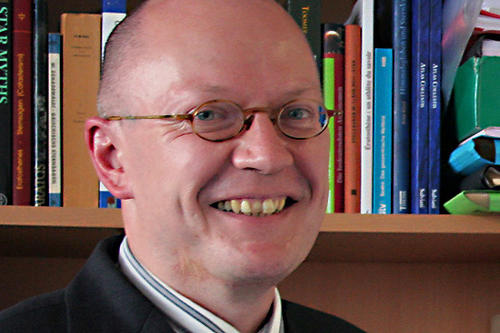Living History
How long does a day’s travel actually take? Who was responsible for setting weights and measures in the ancient world? And how did Roman rulers mark their empire?
Feb 22, 2010
Klaus Geus teaches historical geography of the ancient Mediterranean at Freie Universität Berlin.
Image Credit: Eva Hundemer
Countless issues handed down from the ancient world are still just as relevant today. For Professor Klaus Geus, there is a particular fascination with these questions. He came to Freie Universität Berlin last year to teach historical geography of the ancient Mediterranean – a subject taught nowhere else in Germany in this form.
The very uniqueness of his chair makes Geus proud: “You feel like a pioneer, and you can define the position yourself.” What is important to him is investigating how people lived in ancient times. According to Geus, we need the historical dimension in order to understand the present day.
There are countless issues that are still just as relevant today: How long does a day’s travel actually take? Who was responsible for setting weights and measures in the ancient world? How did Roman rulers mark their empire? The 47-year-old Geus is pursuing the answers to these and similar questions. Together with about 250 academics at Freie Universität and Humboldt Universität, he is participating – in addition to his teaching activities – in research within the Topoi cluster of excellence on the subject of “Formation and Transformation of Space and Knowledge” in ancient civilizations.
Learning from Ancient Experience
When asked how important ancient history is, Geus answers with a story: “Once the Greeks had realized that the Earth was round, the next question was how big it was. Aristotle surmised that the distance between the westernmost edge of the world, the Pillars of Hercules at Gibraltar, and the farthest known part of the east, India, was relatively short. His argument: There were elephants in both Morocco and India. Almost two thousand years later, Christopher Columbus was still influenced by this idea that the Atlantic crossing would be a short distance.”
When Geus tells a story, history comes to life because the historian is firmly convinced that people today can learn from the experiences of those who came before. Before coming to Freie Universität Berlin, Geus taught at the University of Bamberg, where he won the Excellence in Teaching Award (Preis für gute Lehre) in 2002. During his career, he has also been a department spokesperson and associate lecturer at the universities of Tübingen, Jena, Bayreuth, and Mannheim.
A Telescope Bought with Saved Allowance Money
Geus’s new office in Berlin, within the Department of History and Cultural Studies at Freie Universität, is home not only to books on Romans and Greeks, but also a whole host of drawings of constellations, some of them by Geus himself. That’s because another of Geus’s passions is ancient astronomy. He analyzes early writings for insight into the heavens and their importance to life in ancient times. As a young boy, he saved up his allowance money to buy a telescope so that he could watch the stars.
His love of languages also dates to his earliest education. He is fluent in eight to ten languages – “especially Franconian,” he adds with a grin, naming the dialect of his home region of Germany. Geus says he feels very happy and quite at home in Berlin, but his favorite activity is still traveling into the past and bringing history to life in the present day.
Further Information
Prof. Dr. Klaus Geus
Friedrich Meinecke Institute, Freie Universität Berlin
Tel.: +49 (0)30 838-534 22
Email: klaus.geus@fu-berlin.de

